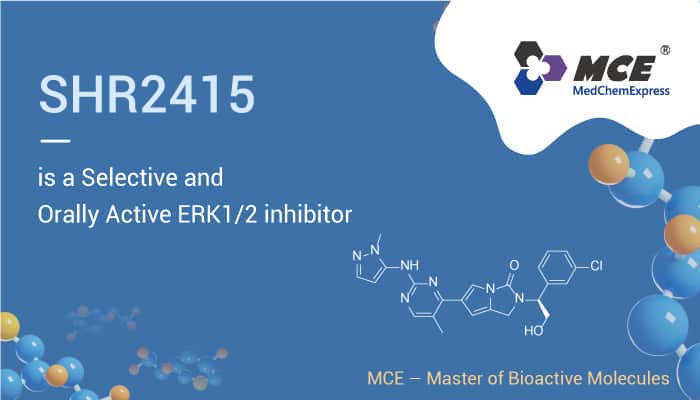ERKs (extracellular signal-regulated kinases) are the original members of the mitogen-activated protein kinase (MAPK) family. They take part in the regulation of meiosis, mitosis, and postmitotic functions, thus, also influencing the development of cancer. ERK1 and ERK2 are important downstream points of the RAS-RAF-MEK-ERK signaling pathway. The two targets can be activated by MEK1/2 via phosphorylation when the pathway is triggered by an exocellular signal. And then activated ERK1/2 can regulate cell survival, proliferation, differentiation, and migration. However, if the MAPK signaling pathway is continuously activated, it may cause malignant cell proliferation and lead to cancer. Therefore, the inhibition of ERK1/2 is an effective treatment for cancer.
SHR2415 is a potent, selective, and orally active ERK1/2 inhibitor.

SHR2415 shows highly inhibitory activities against ERK1 and ERK2 with IC50s of 2.8 and 5.9 nM, respectively. It inhibits the proliferation of Colo205 cells with an IC50s of 44.6 nM as well. The hERG IC50 of SHR2415 is about 14 μM, indicating a relatively low cardiac toxicity. SHR2415 exhibits no apparent CYP1A2, CYP2D6, CYP3A4, and CYP2C19 inhibition (IC50s > 5 μM), but except CYP2C9 (IC50 = 0.79 μM), which suggests that this agent has a certain risk of drug-drug interaction.
Whereas, SHR2415 has favorable pharmacokinetic properties with low clearance and good exposure, plus excellent oral bioavailability (90.8% in mice and 101% in dogs). Furthermore, SHR2415 (25 and 50 mg/kg; p.o., once daily for 14 days) displays remarkable efficacious in inhibition of tumor growth in the Colo205 xenograft model (with a TGI of 112% at 25mg/kg). So, all these experiments suggest that this agent has the potential to become an antineoplastic drug.
In conclusion, SHR2415 is a selective and orally active ERK1/2 inhibitor with antitumor activity.
Reference:
Li X, et al. ACS Med Chem Lett. 2022 Apr 1;13(4):701-706.